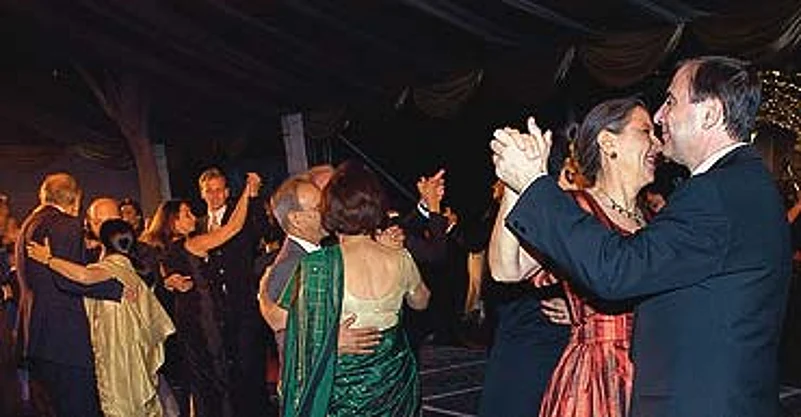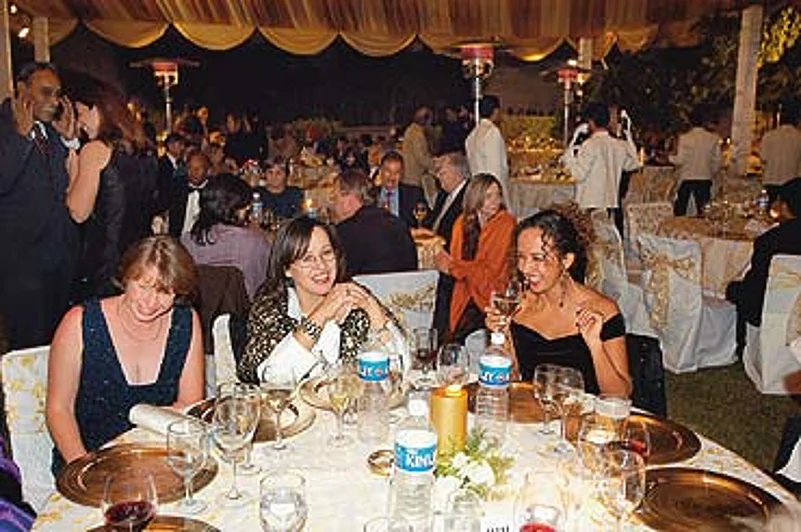
But not everybody's that high-minded. "Some embassies have very good parties because they are genuinely interested and try hard, unlike others," says Mann frankly. So who tries hardest, does best? The answer from the partygoing set is, in one word, Spain. Its flamenco dancers go down a treat, the imported musicians and cooks are a big draw. The spectacular decor and lighting, whether it's a pretty pattern with fairy lights and flowers, or laser shows, are always remembered. The Spanish national day in October was voted party of the season, scoring on every count, from food and drink to entertainment, and that important ingredient—warmth. Even the exacting Seth approves.
Behind it all is hard work. A two-to-four-hour event means six months of planning, a lot of helping hands and, yes, lots of cash. "If we are going to fly down cooks, dancers and musicians from Spain, we need to plan early," points out the elegant Maria de Conde, wife of ambassador Rafael Conde.
Once it's all over, there are flattering phone calls from social secretaries and ambassadors' wives to ask if they can borrow an idea or two. "What could be a better compliment than that," says ambassador Conde proudly, watching his wife blush.

Their big, fat, successful secret? "Good tentwallahs!" booms His Excellency. "And teamwork," adds Maria. "We both do everything together. All you need is a little time, a little care, a little taste, a little money, lots of tent-wallahs and lots of love."
Now for the runners-up. Italy scores high on many counts—painter Satish Gujral extols their energetic "cultural diplomacy"—a recent coup was getting the Parma Opera to perform at the Purana Qila, followed by a grand dinner at the embassy. Media personality Sunil Sethi says the Italians have the perfect party down pat: intelligent hosts, excellent food and great company. "Antonio Armellini and his wife Giovanella are bright, witty people who are well-connected. They always manage to get a great crowd, a good mix of politicians, journalists, artists and bureaucrats," he says. Austria is also quite a hit, not least because of ambassador Jutta Stefan Bastl herself, in the words of one admirer, "one of the most gracious hostesses in town". The annual Viennese Ball in November, with an orchestra flown in from Austria, was a big draw.
Argentina is highly rated for exceptional food and wine. "If your hosts are warm and witty, they'll get the party right," says an attendee, amusedly recalling the 'Sonia Gandhi soup' at an Argentinian do (he can't remember what exactly this soup was—perhaps a mix of Indian spices and Italian seasoning). Also high on the ratings meter for its superb food is Mexico. The Israelis impress with high-powered guests, including senior generals and industrialists. Outgoing Pakistani high commissioner Aziz Ahmed Khan and wife Ayesha have been popular hosts too, for the elegance and warmth of their hospitality. And don't forget Saudi Arabia—the table is so lavishly laden that the lack of alcohol goes unnoticed. The Germans get kudos for entertaining often, offering quantities of beer, sausages and earnest conversation. The cognoscenti, however, complain their parties are often overcrowded. "Their bashes for the World Cup Football and the Oktoberfest were real Janata Jamborees," says one guest disdainfully.

US ambassador Mulford and his wife Jeannie. Americans serve popcorn and bad food at parties.
Now for the brickbats. Who's the worst host? Surprise, surprise, the US of A. Which other country would dare serve popcorn as snack? Recalls a well-known editor, "I once went to an American embassy dinner on an invitation from the ambassador. There was only one course—hamburger and fries. No sweet. The burger was awful and the fries soggy. The world's sole superpower thinks guests should just be grateful for the invite. They are terrible hosts." Fans of ex-US ambassador Richard Celeste and his wife Jacqueline Lundquist (Seth is among them) say it's all been downhill since they left. "Ambassadors are the face of the embassy," says Mani Mann. "They set the tone. The current US ambassador (David Mulford) has not made much of a mark. No one seems to know him." Everyone knew Robert Blackwill, the previous incumbent, but he wasn't exactly the world's best party thrower either, subjecting dinner guests to round-table discussions at which his own views reigned supreme.
Competition for the US comes from two other dull hosts: the British High Commission and France. They might score on their cultural offerings and their charity dos, but it's all sunk in mediocre food—sometimes mediocre Indian food—and cheap wine. Says an indignant guest who knows his wine: "The French serve terrible wine. I promise you my cooking wine tastes better." Another recalls with a shudder favourite British dinner-table touches like dals served in sauceboats, and "curry" seasoned with a strange mango chutney. Some say their food has got better recently, but a vegetarian has the final word: "My secretary calls the British High Commission to inform them that I will be attending a dinner, and that I am vegetarian. I reach my table, and I am served an omelette for dinner. Not once. Not twice. But three times. Why have I dressed up and stepped out of my house? For an omelette?"


























